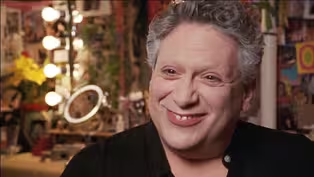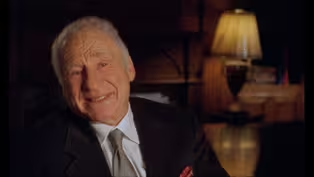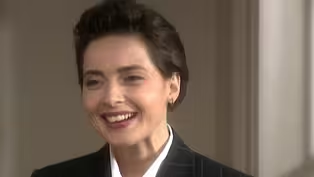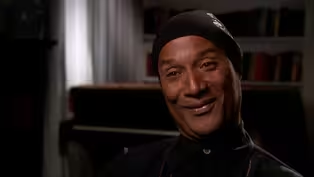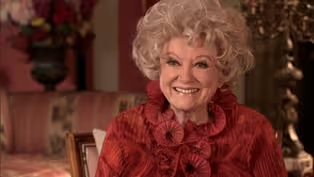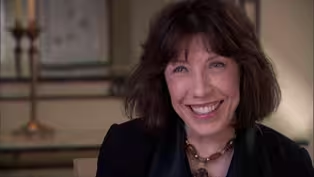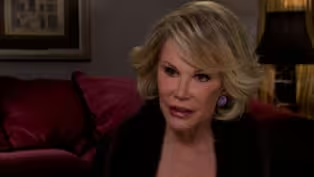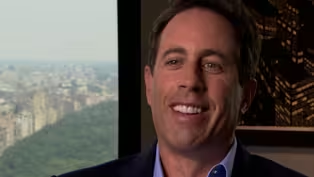
John Kander and Fred Ebb on “Cabaret,” creativity and collaboration
Special | 5m 56sVideo has Closed Captions
Composer John Kander and lyricist Fred Ebb talk about how they have worked together.
In these two interviews from March 29, 1999, composer John Kander and lyricist Fred Ebb talk about how they have worked together to make classics like “Cabaret.” These two Broadway legends are perhaps the most well-known collaborators in theater history. Interview conducted by Michael Kantor for “Broadway: The American Musical” (2004).
Problems playing video? | Closed Captioning Feedback
Problems playing video? | Closed Captioning Feedback
Support for American Masters is provided by the Corporation for Public Broadcasting, AARP, Rosalind P. Walter Foundation, Judith and Burton Resnick, Blanche and Hayward Cirker Charitable Lead Annuity Trust, Koo...

John Kander and Fred Ebb on “Cabaret,” creativity and collaboration
Special | 5m 56sVideo has Closed Captions
In these two interviews from March 29, 1999, composer John Kander and lyricist Fred Ebb talk about how they have worked together to make classics like “Cabaret.” These two Broadway legends are perhaps the most well-known collaborators in theater history. Interview conducted by Michael Kantor for “Broadway: The American Musical” (2004).
Problems playing video? | Closed Captioning Feedback
How to Watch American Masters
American Masters is available to stream on pbs.org and the free PBS App, available on iPhone, Apple TV, Android TV, Android smartphones, Amazon Fire TV, Amazon Fire Tablet, Roku, Samsung Smart TV, and Vizio.
Buy Now
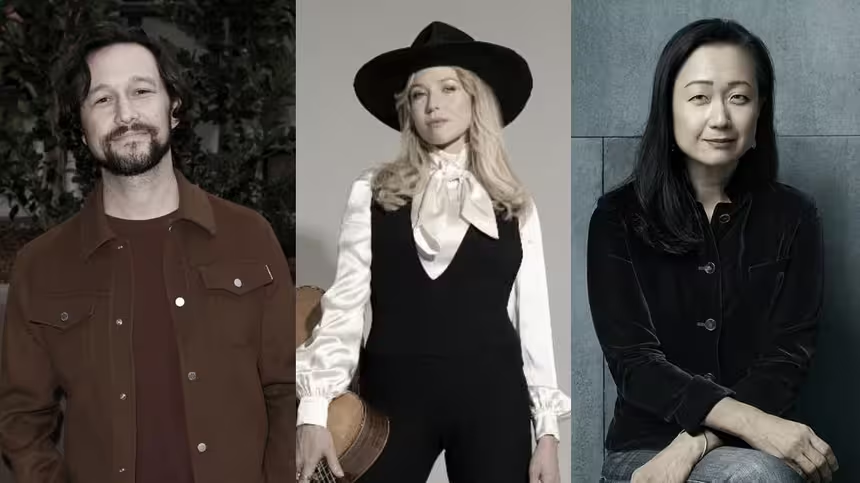
A front row seat to the creative process
How do today’s masters create their art? Each episode an artist reveals how they brought their creative work to life. Hear from artists across disciplines, like actor Joseph Gordon-Levitt, singer-songwriter Jewel, author Min Jin Lee, and more on our podcast "American Masters: Creative Spark."Providing Support for PBS.org
Learn Moreabout PBS online sponsorshipMore from This Collection
Watch curated interviews from The American Masters Digital Archive. The full collection includes over 1,000 hours of never-before-seen, raw interviews: a treasure trove of the movers and shakers of American culture, including Maya Angelou, Patti Smith, Mel Brooks, Carol Burnett, Matthew Broderick, Carl Reiner, Joan Rivers, Dionne Warwick, Lee Grant, Sidney Lumet, Betty White and many others.
Harvey Fierstein on gay representation on Broadway and its deep history
Video has Closed Captions
Harvey Fierstein talks to director Michael Kantor backstage during the production of "Hairspray." (13m 8s)
Video has Closed Captions
Ringo Starr describes his friendship with Mae West. (10m)
Mel Brooks' wild ride to his first Broadway show ever
Video has Closed Captions
Mel Brooks talks about the first Broadway show he ever saw—Cole Porter's "Anything Goes." (5m 44s)
Isabella Rossellini compares her acting and modeling
Video has Closed Captions
Isabella Rossellini discusses her acting versus modeling career. (28m 24s)
Quincy Jones explains how he got started in music
Video has Closed Captions
Quincy Jones discusses his early career, friendships and how he defines himself. (15m)
Paul Mooney on his career and relationship with Richard Pryor
Video has Closed Captions
Paul Mooney reflects on the mechanics of stand-up and his role as Richard Pryor's best friend. (10m 39s)
How Phyllis Diller broke down the doors for female comics
Video has Closed Captions
Phyllis Diller reflects on how her comedy was a response to years of “take my wife” jokes. (11m 35s)
How Lily Tomlin found liberation in exploring her Laugh-In characters
Video has Closed Captions
Lily Tomlin speaks about her time on Laugh-In and how she developed her characters. (12m 35s)
Jeff Foxworthy on how every American might be a "redneck"
Video has Closed Captions
Jeff Foxworthy discusses regionalism in comedy and why "redneck" is a state of mind. (15m 41s)
Joan Rivers finds humor in being yourself
Video has Closed Captions
Joan Rivers speaks about her experience as a female comic in the early 60s. (9m 59s)
Conan O’Brien gets serious about silliness
Video has Closed Captions
Conan O’Brien speaks about his style of late night and his reason for doing comedy. (15m 32s)
Jerry Seinfeld on his place in American sitcom history
Video has Closed Captions
Jerry Seinfeld discusses his collaboration with Larry David and the evolution of the sitcom. (16m 1s)
Providing Support for PBS.org
Learn Moreabout PBS online sponsorship- [Instructor] Which comes first in terms of your work?
- The fact is, the answer we give and which is the truth, is that we work in the same room at the same time and some writer once writing about our work procedure said, then they go into a room and what comes out is a puree of my words and John's music.
And that's about right.
We build a song together lyrically and musically.
- Writing, composing is really a self gratifying exercise, or at least it is for me.
And the fun we had, and it is fun no matter what anybody tells you, of sitting around with our collaborators, Hal was the captain of the collaboration and Joe Masteroff and Fred and I playing what if, what if a rock comes through the window?
What if she has an abortion?
What if we take all of those Berlin songs we wrote and have them sung by one person and what if we call him the MC?
That's really fun.
You don't think at the time that you're having those conversations that it has any significance beyond the piece itself.
- I think the mutual respect people have for each other, and that's what makes it click.
If you respect your collaborators and they respect you, the piece is gonna be better than it might have been when there's no harmony, when there's disrespect, when there's friction.
- Oh, a lot of things I love about Fred's work.
I love its humor.
I love its compassion.
I love the fact that he can rhyme like (beep).
I love the fact that he can improvise in a way that absolutely astounds me.
I think he sort of covers all the bases that a lyricist should ever have to cover in a way that nobody else can quite touch.
- I think John is smart.
I think there's no pretension in the guy and I just think he's incredibly bright and he's musically so gifted that he makes everything I write sound better than it might have sounded in the hands of someone else.
And I think vamps that he creates for songs, musical settings that he gives my words, I just, without question the best that it could be.
And I'm so pleased and proud that he thinks enough of me to keep working with me 'cause that's how I feel about him.
I just think he's the best and I'm lucky to have 'em.
- I think that what's kept our collaboration working all these years is because it's really fun.
I think whatever, whatever project we're working on, even when we're writing badly, which is a lot of the time and we have to throw it away the next day, the process of working together is always fun.
It sounds very shallow, but it's true.
- I don't think you can sit down and say, this is gonna be a hit or this is gonna be a showstopper.
I think you just do your work and you know, the chips fall where they fall.
I think there's some very good songs and shows of ours that have no life whatever, and some not so hot songs, which are more or less, more popular.
I don't think there's any way of knowing.
I think you just do what you do.
- When you think of what we do, all of us who work in the theater, it's a child game.
We're all playing dress up, we're all playing let's tell a story.
We invent people just like children have their imaginary friends.
We invent characters that we come to believe in more than we believe in real people.
And there's a sort of an eternal childhood that we labor in.
It's like we never got out of third grade.
- I think when you're in rehearsal and they hear the orchestra for the first time and whole cast that's always on your side.
It goes to hear something that's been orchestrated and the look on their faces and the thrill of it all.
I think that's maybe my favorite moment.
- The biggest thrill I get is at the first orchestra rehearsal when the cast comes in and most everything that happens after a show opens is sort of out of my ability to deal with what goes on in rehearsal and in the final days of rehearsal.
And when you finally put it together or when you're in a studio and you see the whole piece running for the first time.
That's exciting.
I think all of us are carpenters.
We're all craftsmen.
And when I listen to something where I think the craft is really there, I admire it.
(bright music)
Support for PBS provided by:
Support for American Masters is provided by the Corporation for Public Broadcasting, AARP, Rosalind P. Walter Foundation, Judith and Burton Resnick, Blanche and Hayward Cirker Charitable Lead Annuity Trust, Koo...

